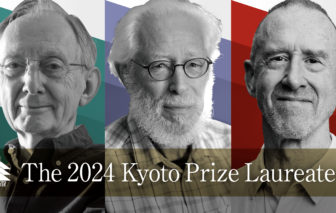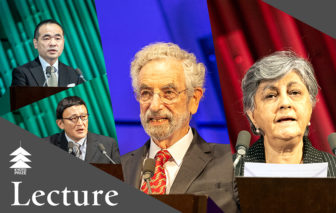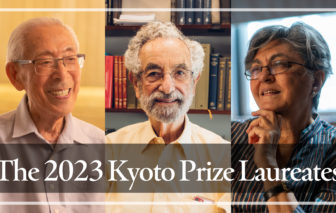
Ryuzo Yanagimachi
2023 Kyoto Prize Laureates
Biotechnology and Medical Technology
/ Reproductive Biologist
1928 - 2023
Professor Emeritus, University of Hawaiʻi at Mānoa
2023
11 /11 Sat
13:00 - 16:00
Place:Kyoto International Conference Center
Capacity:1,500 persons (FCFS)
Admission Free
Ryuzo Yanagimachi demonstrated a method for in vitro fertilization in mammals, expanded our insights into the fertilization process, and further established microinsemination technology by developing and innovating the intracytoplasmic sperm injection. He has made significant contributions to the development of essential assisted reproductive technologies in modern society through both basic research and technological development.
Ryuzo Yanagimachi has made significant contributions to the development of livestock farming and human assisted reproductive technology (ART) through artificial insemination. He advanced fundamental research on fertilization and detailed analysis of the fertilization process of various mammals, and derived the conditions and techniques necessary for fertilization to occur. In particular, his noteworthy achievements include demonstration of mammalian in-vitro fertilization (IVF), the development of intracytoplasmic sperm injection (ICSI) ―a microinsemination technology where a sperm is directly injected into the cytoplasm of an egg cell―, and the improvement of its efficiency through technological innovation. Yanagimachi’s basic research and technological development have made significant contributions to obstetric medicine and modern society, which now faces declining birth rates.
Even before Yanagimachi began his research, there were reports of IVF in some mammals, however, no practical methods existed. In 1963, Yanagimachi succeeded in IVF of hamsters and established a reproducible method for IVF in mammals (1). Utilizing this method, he advanced his analysis of fertilization and deepened our understanding of the intricacies of the fertilization process, such as sperm capacitation, the acrosome reaction, and the zona pellucida reaction in eggs (2–6). These achievements in mammalian fertilization mechanisms have also contributed greatly to the success of IVF in humans.
Yanagimachi further established the ICSI, in which a single sperm is microinjected into the cytoplasm of the egg to achieve fertilization (7, 8). In ICSI, microinjecting sperm requires piercing the zona pellucida and cell membrane of the ovum with a microinjector; however, this process is difficult with conventional methods. Yanagimachi discovered that this challenge could be overcome using a Piezo manipulator and developed the Piezo-ICSI (9). Based on his foundational methods, the Piezo-ICSI has achieved high fertilization and implantation rates and has become established as an ART for male infertility that was difficult to resolve with conventional IVF, bringing great blessings to infertile couples. In addition, Yanagimachi developed a technology that enables fertilization even with freeze-dried sperm by ICSI, demonstrating that sperm can be stored for long periods of time and providing a new option for ART (10, 11).
Yanagimachi’s team also succeeded in creating cloned mice by somatic cell nuclear transfer in 2000 (12). Unlike the cloned sheep developed the previous year, his cloned mice were able to produce offspring over several generations and have made significant contributions to the development of cloned animal research (12).
Thus, Yanagimachi’s fundamental research on the phenomenon of fertilization and the development of ART has been applied not only to human reproductive medicine but also to livestock farming and the conservation of rare animal species. It can be concluded that Yanagimachi has made significant contributions to the development of modern society.
For these reasons, the Inamori Foundation is pleased to present the 2023 Kyoto Prize in Advanced Technology to Ryuzo Yanagimachi.
References
(1) Yanagimachi R & Chang MC (1963) Fertilization of Hamster Eggs in vitro. Nature 200: 281–282.
(2) Barros C & Yanagimachi R (1971) Induction of Zona Reaction in Golden Hamster Eggs by Cortical Granule Material. Nature 233: 268–269.
(3) Nicolson GL & Yanagimachi R (1972) Terminal Saccharides on Sperm Plasma Membranes: Identification by Specific Agglutinins. Science 177: 276–279.
(4) Oikawa T, Yanagimachi R, & Nicolson GL (1973) Wheat Germ Agglutinin blocks Mammalian Fertilization. Nature 241: 256–259.
(5) Nicolson GL & Yanagimachi R (1974) Mobility and the Restriction of Mobility of Plasma Membrane Lectin-Binding Components. Science 184: 1294–1296.
(6) Steinhardt RA, Epel D, Carroll EJ, Jr., & Yanagimachi R (1974) Is calcium ionophore a universal activator for unfertilised eggs? Nature 252: 41–43.
(7) Uehara T & Yanagimachi R (1976) Microsurgical Injection of Spermatozoa into Hamster Eggs with Subsequent Transformation of Sperm Nuclei into Male Pronuclei. Biol Reprod 15: 467–470.
(8) Uehara T & Yanagimachi R (1977) Behavior of Nuclei of Testicular, Caput and Cauda Epididymal Spermatozoa Injected into Hamster Eggs. Biol Reprod 16: 315–321.
(9) Kimura Y & Yanagimachi R (1995) Intracytoplasmic Sperm Injection in the Mouse. Biol Reprod 52: 709–720.
(10) Wakayama T & Yanagimachi R (1998) Development of normal mice from oocytes injected with freeze-dried spermatozoa. Nat Biotechnol 16: 639–641.
(11) Perry AC et al. (1999) Mammalian Transgenesis by Intracytoplasmic Sperm Injection. Science 284: 1180–1183.
(12) Wakayama T et al. (2000) Cloning of mice to six generations. Nature 407: 318–319.
Profile is at the time of the award.

The 2024 Kyoto Prize Laureates Introduction Videos Are Now Available!
The 2024 Kyoto Prize Laureates Introduction Videos Are Now Available!

Videos of the 2023 Kyoto Prize Commemorative Lecture Are Now Available!
Videos of the 2023 Kyoto Prize Commemorative Lecture Are Now Available!

The 2023 Kyoto Prize Laureates Introduction Videos Are Now Available!
The 2023 Kyoto Prize Laureates Introduction Videos Are Now Available!